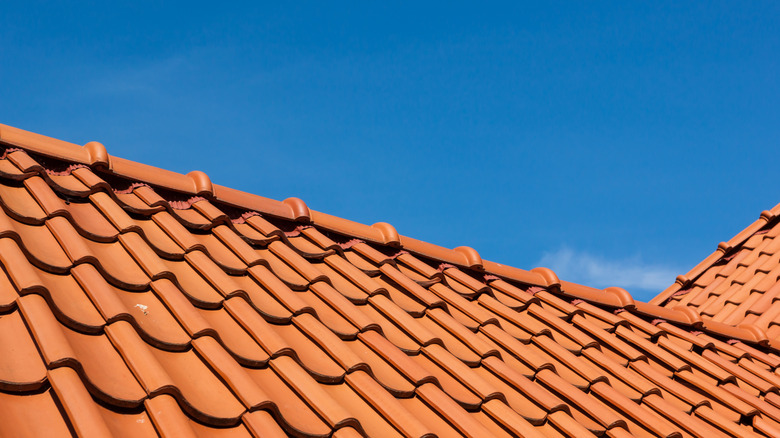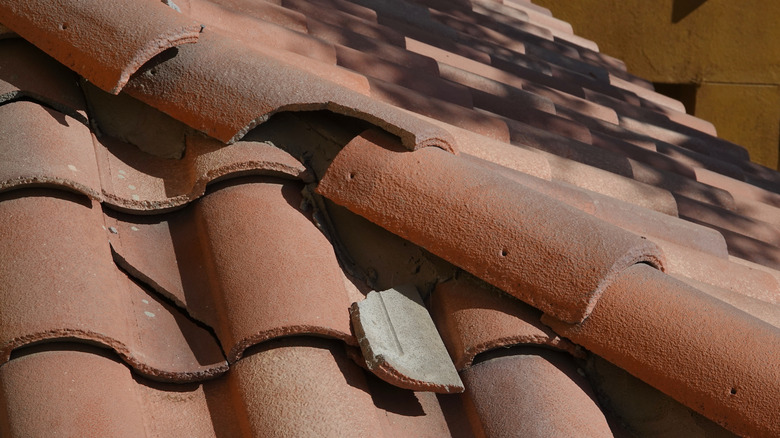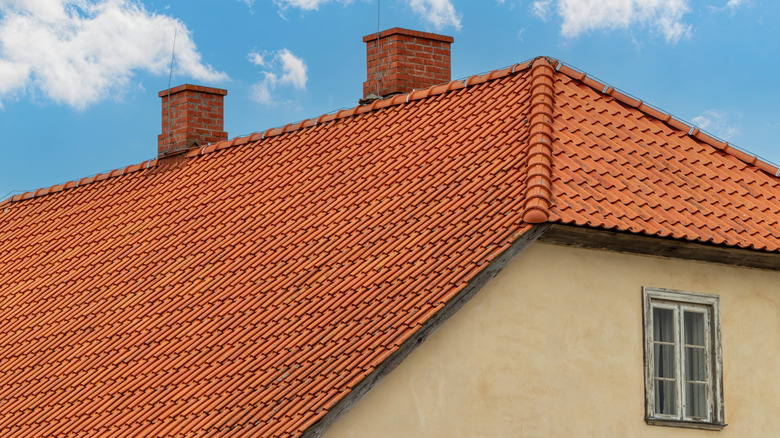Our Expert Tells Us The Downsides To Consider Before Choosing A Clay Tile Roof
A clay tile roof can make your home feel like a Mediterranean getaway, so it's no surprise that many homeowners select this option. Unfortunately, the visual appeal of this roofing material does come at a cost — meaning that it's not the right choice for everyone. If you've been on the fence about installing a clay tile roof, take some time to weigh the pros and cons to help make your decision. While speaking exclusively to House Digest, Andre Afsharian, Owner of Roof Repair Specialist, shared the downsides to consider before choosing a clay tile roof. According to the expert, this material is heavy, costly, often fragile, and comes with a high-maintenance underlayment.
With all these drawbacks, you might question why clay tile is used as a roofing material at all; but tile roofing offers a long list of advantages as well. "Despite the downsides, many Southern California homeowners still opt for clay tiles because of their unique benefits," Afsharian shared. These perks range from visual appeal to high energy efficiency. As you now know, there's a lot to consider when evaluating whether a clay tile roof is the right choice for your home. Luckily, Afsharian broke down everything you need to know.
The cons of a clay tile roof
Let's dive further into the downsides of a clay tile roof. According to Afsharian, the weight of the clay tile could make this material incompatible with your home. "Clay tiles are significantly heavier than other roofing materials," he shared, while speaking exclusively with House Digest. "Your home's structure must be able to handle the extra weight, which may require structural reinforcement. If your home wasn't originally built for tile, the additional work can add to the cost."
That added cost might push this roofing material out of your budget, since it's already pricey to install, which is another downside Afsharian highlighted. "While clay tiles can last for decades, the upfront cost is higher than other materials like asphalt shingles or metal roofs," the expert explained. "The price per square foot for both materials and labor can be a significant investment."
Cost aside, you would also have to worry about the fragility of this roofing type. Afsharian explained that clay tile can crack if it's improperly handled. Walking on the material to complete repairs can also lead to damage, as the person's weight may cause tiles to break. The limited versatility of clay tile is the next downside the expert discussed. Specifically, he warned that clay tiles do not complement traditional home styles very well. The final con to be aware of is the maintenance requirements of a clay tile roof assembly. "The underlayment usually needs replacement every 20-30 years, which involves carefully removing and reinstalling the tiles," Afsharian revealed.
Should you consider clay tile roofing despite its drawbacks?
You might find that the pros of clay roofing tiles outweigh their downsides. "One of the biggest selling points is their longevity," Afsharian said of the life expectancy of the roof type while speaking exclusively to House Digest. "A well-installed clay tile roof can last 50 to 100 years, far outlasting most other roofing materials." Visual appeal is obviously a major plus as well. "Clay tiles are timeless and instantly add curb appeal," Afsharian said of the material. "They are especially popular in Southern California, where Mediterranean and Spanish-style architecture is prevalent."
Another benefit the expert highlighted might interest you if you've been looking for ways to make your home more eco-friendly. According to Afsharian, clay tiles can help regulate the temperature inside your home. The tiles reflect sunlight, while their design makes it possible for air to circulate underneath. These qualities help keep your house cool and reduce your energy usage during the summer months. The final benefit the expert highlighted is the heat and fire resistance of clay tiles, which makes them perfect for hot, arid climates.
If you're still on the fence about installing a clay tile roof, Afsharian shared a few tips to help you decide whether this material is right for you. First and foremost, evaluate whether clay tiles are compatible with the structure of your home. Also, consider the impact of the large upfront investment, the maintenance requirements, the style of your home, and your local climate.


